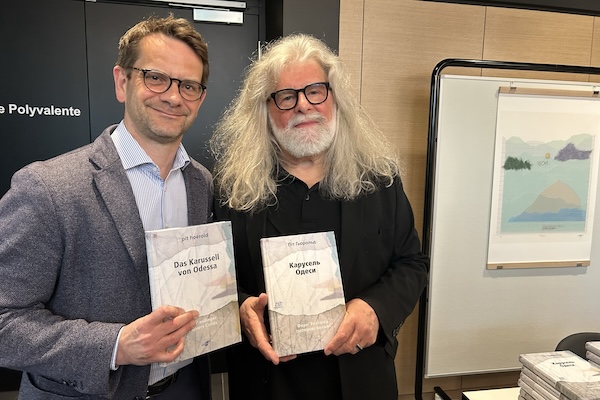 (L-R) Laurent Zeimet, Mayor of Bettembourg; Poet Pit Hoerold.;
Credit: Helen O'Mahony. Chronicle.lu
(L-R) Laurent Zeimet, Mayor of Bettembourg; Poet Pit Hoerold.;
Credit: Helen O'Mahony. Chronicle.lu
On Wednesday 23 April 2025, the launch of Карусель Одеси, the Ukrainian translation of Das Karussell von Odessa (The Odessa Carousel) took place at Luxembourg’s LiteraTour festival at the KulTourhaus in Huncherange (Bettembourg).
Das Karussell von Odessa, written in German by Luxembourgish poet Pit Hoerold, is a collection of poems detailing life in Ukraine, following Russia’s full-scale invasion of the country in February 2022. The collection, first published in 2023, was translated into Ukrainian by Yevgeniya Inozemtseva and Iryna Skrypak and is illustrated by Fern' Rollinger. The author’s deep connection with, together with his detailed descriptions and awareness of the situation in Ukraine, has been described as an emotional capturing of the realities of the war.
Laurent Zeimet, Mayor of Bettembourg, opened the evening’s event by welcoming guests and recalling his trip, with a Luxembourg Parliamentary delegation, to Kyiv, Ukraine, in February 2025. He expressed the importance of hope, especially the hope that Ukraine will attain its freedom and the belief that “things may look dark, but good will win”. He stressed how the evening’s event offered the opportunity to show solidarity and support with the country.
A musical interlude with two Philharmonic Orchestra violinists, Atilla Keresztesi and Ukrainian Andrii Chugai, followed, in which one Ukrainian and two French compositions were played.
Project manager Angelica Domas explained how she first met Pit Hoerold in January 2023 and quickly realised that the collection’s story should be accessible in Ukrainian. Collaboration with the author and the municipality of Bettembourg began in August 2024 and with the assistance of a team of translators and financial support from Banque International à Luxembourg (BIL) the project came to fruition, leading to the launch of Карусель Одеси, a “shared effort that preserves stories and voices”.
Nicolas Zharov, President of l’Ukraine Asbl, thanked Luxembourg and the municipality of Bettembourg for the support shown during the 1,155 days that have passed since the invasion began on 24 February 2022. He spoke of Russian efforts to destroy Ukraine’s cultural identities and thanked Pit Hoerold for preserving the voices of Ukrainians before adding that he hoped the book would be translated into other languages. He emphasised Pit Hoerold’s astonishing understanding of the Ukrainian situation, as well as the emotions and feelings apparent in the collection, despite him never having been to Ukraine. He added that this translation brings the people of Luxembourg and Ukraine closer together.
Translators Yevgeniya Inozemtseva and Iryna Skrypak gave insights on the translation process in German and Ukranian, before the author, together with Iryna Skrypak and Maria Kolesnyk read fourteen poems, seven in German and seven in Ukrainian, from the collections. The readings were accompanied by music from Patrick Hurt on piano. Pit Hoerold and Fern' Rollinger then discussed the collection in German, with Ukranian translation, before the final musical interlude which included Ukraine’s unofficial anthem “Prayer for Ukraine”. Mayor Zeimet brought the evening to a conclusion by inviting the approximately 50 attendees to a drinks reception.
Chronicle.lu spoke with Yevgeniya Inozemtseva following the event. Ms Inozemtseva praised Pit Hoerold’s talent, stating that his insight into the emotions and feelings of those experiencing the war was even more remarkable given the fact that he had never been in the country and was removed from the everyday events of the war. She praised his impressive research, apparent throughout the collection, including a description of the stars that would have been visible in the Ukrainian night sky at a particular time. Ms Inozemtseva explained that the collection details Ukrainian life in a chronological order, from spring through to summer, autumn and winter, in the year following the invasion. The poems discuss everyday life, from people looking out windows to standing in their kitchens, as well as more serious aspects. It channels the voices of soldiers, mothers, children and the ordinary Ukrainian, to capture and bring reality to life. She spoke of the difficulties separating her personal emotions to concentrate on the professional task in hand, as many of his poems resonated deeply and emotionally with her. She gave the example of Pit Hoerold’s humanity as he described Russian soldiers as also being human. Ms Inozemtseva expressed the hope that the collection would be translated into further languages, including English, as it deserved to be read and appreciated further afield.









